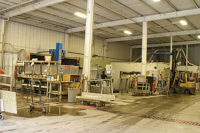In the “Forum” section of this issue (page 106),
I had the unfortunate task of recapping the distressing events surrounding the
closure of Rock Tops, a Michigan
firm with multiple operations in several states. Although it is bad news to
hear of any event that leaves stoneworking professionals out of a job, the
closure of Rock Tops is at once a “worst case scenario” and a cautionary
tale.
Without re-counting all of the depressing details, it
appears that Rock Tops’ employees, vendors and customers have all taken a
severe financial hit, and as of press time for this issue, no one has been able
to make contact with the owners. Moreover, the mainstream media - including
newspapers as well as multiple television outlets - has picked up on the
story.
At a time when overall finances make it hard enough
to sell granite countertops to the general public, stories like this can breed
a distrust for stone fabricators in general. As one fabricator simply put it,
the Rock Tops story is a “black eye” for the industry.
And
while it is a painful necessity for Stone World and other industry outlets to
publish stories like this, the sad fact is that the mainstream loves negative
stories like this. They thrive on the opportunity to report the very worst
details on a single, isolated situation, stare poignantly into the camera and
declare, “Remember this, homeowners: you have to BEWARE when you’re buying
granite countertops.” We all dealt with this same nonsense when it came to the
“Great Radon Scare of 2008.” It’s pathetic, really.
As one
fabricator said to me, “We need to get the word out that most of the stone
industry is not only working on keeping their business, but also continuing to
try and make their products and services better. During these times it would be
easy to cut corners, do a little less, make a little more. The ‘real’
fabricators are making less and doing more and are focused on the
stonework.”
So what can the industry do to portray itself in
a more positive light? There is no easy answer to this question, but it starts
with communicating with the customer. A lot of fabricators out there do a
terrific job of explaining the process for purchasing and installing a kitchen
countertop. They make sure that the homeowner knows exactly what to expect in
terms of material variations, seams, installation details and the countless
other details that go along with a given project. This needs to
continue.
By making the customer part of the process (even
when the customer is a bit of a pain), you are sharing in the project together.
I remember visiting one particularly interactive showroom where the credo was,
“We’re not designing your kitchen; you are.” By using this philosophy, the
fabricator reported that customers took a certain level of pride - and
responsibility - for the finished project.
Moreover, the
personal craftsmanship of natural stone might be something that can be further
emphasized to homeowners. When a customer is building their dream kitchen, the
countertops are one of the only elements where they get to see the raw
materials turn into a finished product, and they often have a chance to see and
understand the craftsmanship of the stoneworking process. This isn’t true of the
Sub-Zero refrigerator, the gourmet stove or even the custom-made
cabinets.
I’ve said many times in this column that the stone
fabricator should never be classified as “just another subcontractor,” and this
remains true even as stories like Rock Tops are making headlines. The vast
majority of stone fabricators out there are skilled craftsmen working with the
premier building material in the world, and we need to continue to emphasize
this to the homeowners - now more than ever.
Emphasizing the Positives




